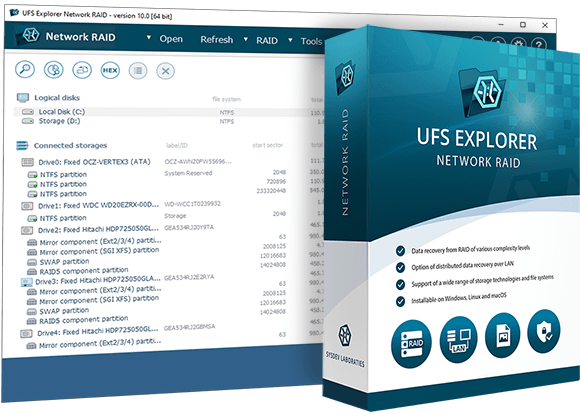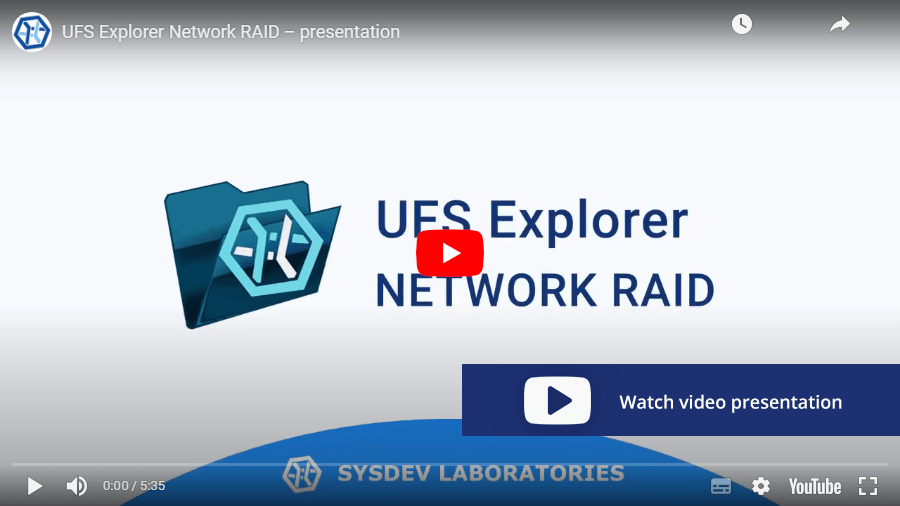
UFS Explorer Network RAID
- Data recovery from simple media or RAID using LAN resources
- Equally efficient work with local and remote storage devices
- Embedded iSCSI client and server for sharing resoucese
- Auto-reconstruction of various RAID configurations
- Adjustable RAID builder for manual RAID assembly
- Support of specific RAID patterns and other storage technologies
- Includes professional-level disk imager for handling faulty drives
- Free trial with no time limit is available

- LAN
- iSCSI
- Remote recovery
- RAID recovery
- NAS recovery
- QNAP
- Buffalo
- Synology
- Drobo
- Apple RAID
- Fusion Drive
- FileVault
- BitLocker
- Dynamic Disk
- USB stick
- External drive
- Memory card
- Disk image
- DeepSpar DDI
- Synology
- Asustor
- TeraStation
- Terramaster
- RAID5
- RAID6
- ZFS
- RAID-Z
Overview
UFS Explorer Network RAID allows service centers to use internal network resources to handle data recovery requests. There may be several reasons for this: insufficient number of standard ports for connecting disks, use of specific additional equipment with a limited number of ports for each workstation, use of a more powerful remote workstation or a remote station with a different OS.
When working in modern local networks with a data transfer speed of 10Gbit/sec, work with network resources is performed with minimal delays: almost the same as through a local SAS HBA. at the same time, even in historical networks with a transmission speed of 1 Gbit/sec, work is still quite comfortable.
The program can communicate with another copy of the program on another workstation using the standard iSCSI protocol or its own UDP-based protocol with lower delays. Using the standard iSCSI protocol allows other clients to connect to the application. Thus, for example, you can connect a volume collected by the program as a local SCSI disk using, for example, Windows iSCSI Initiator. In addition, the software can communicate with some products of other vendors, such as DeepSpar DDI.
Along with local and remote disks, the program works with disk images or virtual disks as efficiently as with original disks. Therefore, if you have disk images, it is recommended to use them. Due to the wide support of various formats, the program allows you to use images created by other (third-party) software.
Just like any other UFS Explorer software, this software edition automatically constructs data volumes both from individual disks and from RAID disk sets. Some technologies, such as Drobo BeyondRAID or LVM Thin Provisioning, require explicit assembly of volumes with the help of special tools available in the program. Additional tools also allow you to assemble volumes that for some reason are not assembled automatically. Once the volume becomes available, the program automatically provides access to the files on it, without any scanning or analysis, just like the OS does. If you need to search for lost data or reconstruct the volume structure after damage, the software supports several types of quick and deep analysis (scanning) to search for lost data.
To restore lost data and copy found files, you need to license only a copy of the program used to copy.
Technical specifications
Generic: FAT, FAT32, exFAT
Windows: NTFS, ReFS/ReFS3
macOS: HFS+, APFS;
Linux: Ext2, Ext3, Ext4, XFS, Extended format XFS, JFS, ReiserFS, Btrfs;
BSD/Solaris: UFS, UFS2, Adaptec UFS, big-endian UFS, ZFS.
CD/DVD/media: ISO9660/Joliet, UDF
Logical Disk Manager, Storage Spaces, Microsoft volume deduplication, Apple Core Storage, Apple Software RAID, LVM, mdadm, supported hardware and software RAID metadata.
MBR, Apple Partition Map, BSD/Adaptec/Solaris/Unix Slice Map, GPT, Novel, RAID
Providing a partition table, information about Spans and Stripes of AIX LVM, HP-UX LVM
Indication of Drobo volumes, HP EVA, HP LeftHand, Symphony SAN, HPE 3PAR etc.
Hexadecimal viewer for storages, partitions and files
Recognition of certain data protection bridges/adaptors (OpenText Tableau, CRU WiebeTech)
Control over disk imaging with DeepSpar USB Stabilizer/Guardonix
Pausing the scan
Previewing intermediate scan results
Saving a current scan state for the future scan resumption from the checkpoint
Saving scan results for further work
Full-range storage scan for all-at-once data recovery
Five options for handling the existing file system
Integrated management of custom rules for raw recovery
Indication of the state of each file
Color differentiation between the existing/restored data
Options for preview, search, sorting, filtering of files
Automatic detection of lost partitions
Search for lost partitions
Defining partitions manually
Automated partition aligning
Helpful prompts
Zooming option
Recoverable data size with metadata test
Software events log
- Download links for all previous product versions starting from Version 7 (including Versions 7.*, 8.*, 9.*) and up to the current version are provided in the Changes log. There you will also see the record of updates and their descriptions.
